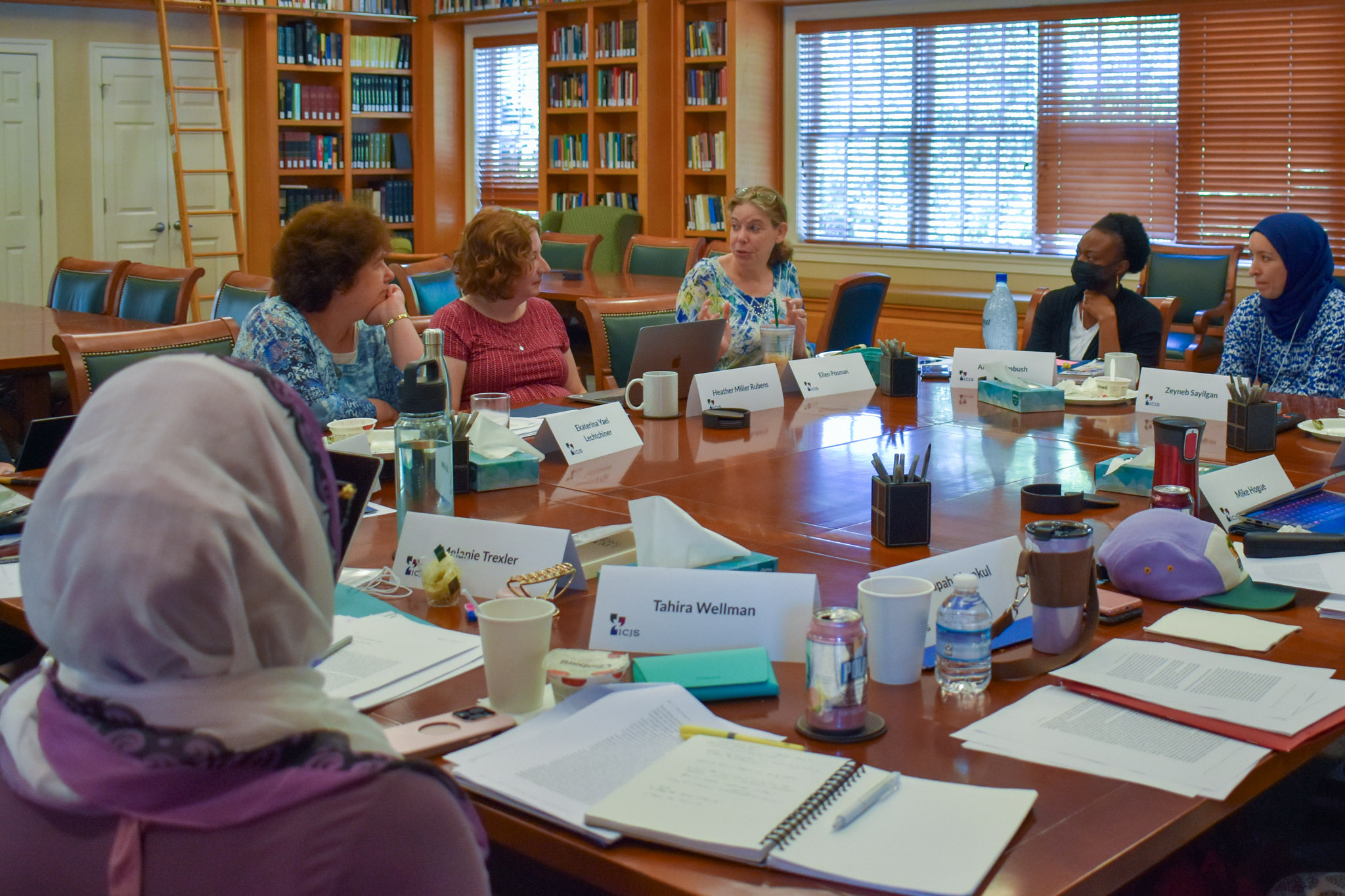
The ICJS Faculty Seminar typically features a rigorous academic inquiry into a given subject from an interreligious perspective. But the topic of the 2024 seminar—Interreligious Perspectives on Death and Dying—called for something more. Participants brought their personal experiences of mortality into the seminar room.
“Anything having to do with death and dying brings a certain degree of emotional presence into the room,” said Zeyneb Sayilgan, ICJS Muslim scholar, who co-led the seminar with Alisha Wimbush, ICJS program director for religious leaders. “That led to a lot of deep sharing of personal stories.”
The ubiquity of death
Ellen Posman, a religious studies professor at Baldwin Wallace College in Berea, Ohio, who teaches a course on death, said it was an unusual experience for university faculty to venture beyond a dispassionate, analytical approach. But the ubiquity of the topic made it easier to encourage personal sharing.
“I mean, everybody’s lost somebody,” she said. “These are deep, personal issues. The fact that we were encouraged to bring our personal perspectives, thoughts, and experiences—in addition to our academic study and teaching of the subject—made it pretty unique.”
Richard McCarron, a theologian who teaches at Catholic Theological Union in Chicago, said he was deeply moved by the sense of trust and care that developed over the week-long seminar, and the space that allowed that to happen.
“One way I described the experience when we were talking about it when it ended was we were on holy ground. It was a place and space for a time of encounter,” he said.
Engaging academics and practitioners
In addition to university and seminary professors, the seminar included practitioners, such as chaplains, spiritual care providers, and death doulas (someone who guides a person who is dying, and their family, through the death process). Chaplains, especially those who work in hospitals or hospices, bring a wealth of experience to the discussions.
“Chaplains, because they’re ‘on the ground,’ working with people from different religious backgrounds, brought a very practical dimension to the seminar,” Wimbush said.
That practicality was reflected in the kinds of questions they raised. “If you’re working with a Muslim patient, what are some of the things you need to be aware of when it comes to end of life issues? The same if you’re working with a Jewish patient or a Christian patient,” she said. “I think they left the Faculty Seminar with things they could put into practice right away.”
“I think [chaplains] brought this ease of dealing with all these difficult discussions and topics, and they brought vulnerability,” said Ekaterina Yael Lechtchiner, a chaplain with Hackensack Meridian Health. “Chaplain training—Clinical Pastoral Education—is very much in this style. It’s more about connecting.”
Sayilgan and Wimbush first started talking about doing a program on death and dying in the wake of the Covid19 pandemic. “I was talking to Alicia and I said, ‘You know, so many people are grieving and death is all around us, but nobody wants to talk about it,’” Sayilgan said. “This was such a profound experience globally but it has not been processed at all.”
Sayilgan has also focused her writing and scholarship on death and dying in the wake of the death of her 3-year-old daughter, Meryem, in December 2022. Several seminar participants referenced an article Zeyneb wrote about how she is dealing with her grief by participating in the Muslim death rituals of her community, including the washing of bodies in preparation for burial. Posman said she intends to use the article in her course.
“It’s a short piece, It is deeply personal. And it includes a lot about Islam in a way that I think my students will better understand Islam and death better than just reading a chapter in a textbook,” she said.
Spirited discussions
The seminar included explorations of customs and rituals related to death from many religious traditions. One topic that sparked a spirited discussion revolved around the idea of a “good death.” What does that mean—a peaceful passing with gathered family? Or is it a philosophical coming to terms with death? Is a “good death” even possible or desirable? One participant said her Gen Z students found that whole notion ridiculous because all death is bad.
Discussions also included some innovative perspectives.
“One of the presenters talked about structural grief, which stood out because it was a new concept for all of us,” Wimbush said. “We normally focus on personal loss. This helps us to think about systemic loss, like losing our democracy, or environmental losses.
“What does it mean when we see our physical landscapes changing, when we see climate change?” she said. “How do we grieve those losses?”